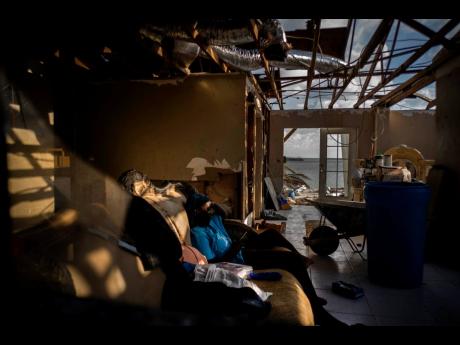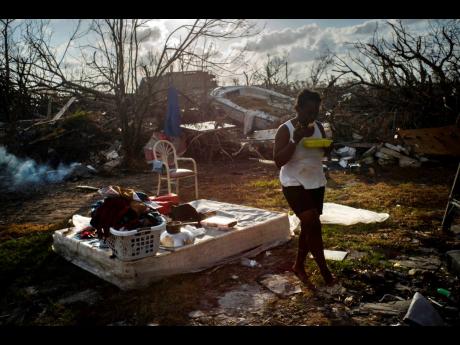Salvation Army officers denied entry to The Bahamas … Immigration claims Haitian team members need visa to enter hurricane-ravished country to provide assistance
Two Haitians living in Jamaica, who were hoping to join the early hurricane relief efforts in The Bahamas, were left stranded in Florida last week. Immigration officials insisted that they needed a Bahamian visa to enter the country.
Emergency disaster coordinator for the Salvation Army in the Caribbean, Major Vilo Exhantus, said he and another colleague from Montego Bay, St James, had travelled to the United States on Tuesday evening, with the intention of flying to The Bahamas on Wednesday to help coordinate and distribute well- needed supplies to citizens of the hurricane-ravished country.
The Bahamas was devastated by the powerful Category 5 Hurricane Dorian earlier this month. More than 70,000 people have been affected and at least 50 persons were killed.
Exhantus said when the Salvation Army officers turned up at the Fort Pierce airport on Wednesday to board the private plane awaiting them, he and a colleague, Captain Kenel Jean, were kept back, while the other officers, who were from the United States, Canada and the United Kingdom, were allowed to go ahead.
“We were given clearance. Our representatives in The Bahamas went to immigration and the government and they said yes, we could come, but then now that we are ready to go, they said that it has been changed, we need to have a Bahamian visa to get in,” Exhantus explained when The Sunday Gleaner contacted him on Thursday morning.
“We were told that we are not British, or Canadians or Americans, so we need visas to go in, that’s the foolish part of it.”
None of the other officers had Bahamian visas.
DISCRIMINATION BY THE BAHAMIAN GOVERNMENT
“I am the leader of the group, but the others could go. They are gone and I am left behind with my colleague here,” said Exhantus, who over the years has helped to coordinate several relief efforts on behalf of the Salvation Army following natural disasters across the Caribbean region.
“We are feeling bad because they are waiting on me because I am the disaster coordinator for the Caribbean and my papers were sent there. They asked for our papers to be sent so that they can look at it and they said it was okay for us to go. We have our US visas and we have been around the Caribbean.”
On Friday morning, the major and the captain were still stranded in Florida trying to get to The Bahamas. But even as they waited to gain entry to the country that had spurned them, he was still organising things on the ground.
“My colleagues from there, they have to call me here because they don’t speak Creole and most of the people that are affected and that are in need are Haitians there in The Bahamas,” Exhantus stated, as he considered their dilemma.
“It is just discrimination by the Bahamian government. Somebody has to address this issue.”
By Friday afternoon, however, following a visit to the Bahamian Consulate in Miami, Exhantus and Jean were finally given clearance to travel to The Bahamas.
Both Exhantus and Jean were born in Haiti, but have been living in Jamaica for several years. Exhantus has served as a commander in the Salvation Army in both Haiti and the Dominican Republic.
Jamaica, Haiti and The Bahamas are member states of the Caribbean Community (CARICOM). Citizens from all CARICOM countries are guaranteed free movement among member states without restrictions.
NO RESTRICTIONS FOR JAMAICANS
When contacted, Jamaica’s honorary consul in The Bahamas, Terrel Butler, assured that there were no restrictions being placed on Jamaicans coming to The Bahamas, to the best of her knowledge. This was also reiterated by Jamaica’s Consul General to Miami, Oliver Mair.
However, they could not speak to the matter as it relates to Haitians.
Exhantus is advising persons to make extra careful checks before venturing to The Bahamas.
The Bahamas – which is a cluster of 700 islands, 30 of which are inhabited – has tightened its immigration laws considerably in the past few years in order to curtail the islands’ large population of Haitians. Haitians are currently the country’s largest ethnic minority, and many who had arrived there illegally live constantly in fear of being deported.
Charity organisation coordinating relief efforts
Following the devastation from Hurricane Dorian, the Salvation Army hurricane response team has been providing food, water, clothing, personal hygiene supplies and shelter to evacuees in Grand Bahama and Nassau in The Bahamas.
In addition to working with the National Emergency Management Agency on the islands, the charity organisation is currently coordinating with the government manager of relief efforts for Abaco, Jack Thompson, to develop a long-term plan for relief and rebuilding.
The Salvation Army is also currently coordinating and managing the response for Rotary International through their incident command centre, and is partnering with Norwegian Cruise lines, which has already provided approximately three-quarters of a million US dollars’ worth of supplies and support services.




